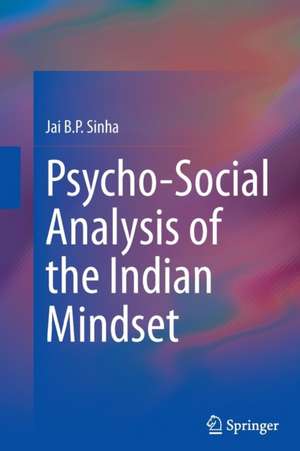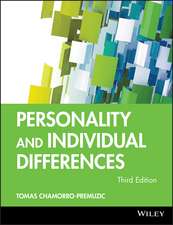Psycho-Social Analysis of the Indian Mindset
Autor Jai B.P. Sinhaen Limba Engleză Paperback – 23 aug 2016
This volume draws evidence from ancient texts and the latest national and international research, many of which were conducted by the author and his associates. It does not, however, hesitate to indulge in anecdotal evidence, cases and speculative ideas in order to complete the picture. The author takes an in-depth view of the Indian mindset without getting the reader lost in either the intricacies of ancient philosophical abyss or the trivialities of present-day non-events.
| Toate formatele și edițiile | Preț | Express |
|---|---|---|
| Paperback (1) | 378.83 lei 43-57 zile | |
| Springer India – 23 aug 2016 | 378.83 lei 43-57 zile | |
| Hardback (1) | 385.99 lei 43-57 zile | |
| Springer India – 3 noi 2014 | 385.99 lei 43-57 zile |
Preț: 378.83 lei
Nou
Puncte Express: 568
Preț estimativ în valută:
72.50€ • 75.31$ • 60.22£
72.50€ • 75.31$ • 60.22£
Carte tipărită la comandă
Livrare economică 03-17 februarie 25
Preluare comenzi: 021 569.72.76
Specificații
ISBN-13: 9788132235095
ISBN-10: 8132235096
Pagini: 268
Ilustrații: XXI, 244 p. 7 illus.
Dimensiuni: 155 x 235 x 14 mm
Greutate: 0.38 kg
Ediția:Softcover reprint of the original 1st ed. 2014
Editura: Springer India
Colecția Springer
Locul publicării:New Delhi, India
ISBN-10: 8132235096
Pagini: 268
Ilustrații: XXI, 244 p. 7 illus.
Dimensiuni: 155 x 235 x 14 mm
Greutate: 0.38 kg
Ediția:Softcover reprint of the original 1st ed. 2014
Editura: Springer India
Colecția Springer
Locul publicării:New Delhi, India
Cuprins
Chapter 1. The Framework.- Chapter 2. Collectivism and Individualism.- Chapter 3. Hierarchy and Power Process.- Chapter 4. Spirituality and Materialism.- Chapter 5. Religiosity, Secularism, and Sexuality.- Chapter 6. Entrepreneurship amidst Dependence Proneness.- Chapter 7. The Paradoxical Mindset.- Chapter 8. The Shifting Mindset.- Chapter 9. Mindset in the Larger Context.- Chapter 10. Epilogue.
Recenzii
“In this book, Jai B.P. Sinha has proposed how several cultural patterns have evolved in India and their influence on the psychological and behavioral functioning of Indians. … This book demonstrates the extent of usability and practicality of Western models in Indian society and need for the generation and application of Indian concepts. … the book opens new directions for the academicians to combine historical and philosophical understanding with empirical work.” (Rishabh Rai and Anand Prakash, Psychological Studies, Vol. 62, 2017)
Notă biografică
Jai B. P. Sinha is Professor of Psychology and Management at the ASSERT Institute of Management, Patna, India. Professor Sinha completed his post graduation in India and received his Ph.D. from Ohio State University, Ohio, USA. He has been a visiting professor at Hunter College of City University of New York, Wake Forest University, Winston-Salem (USA), McGill University, Montreal (Canada) and Copenhagen Business School (Denmark). He has been a National Fellow of the Indian Council of Social Science Research; National Lecturer of the University Grants Commission, Government of India; Senior Fulbright Fellow. He was a member of the Executives of the International Association of Applied Psychology and International Association for Cross-Cultural Psychology and Vice President of the World Association for Dynamic Psychiatry. He is an Honorary Fellow of the World Association for Dynamic Psychiatry and Honorary Fellow of the National Academy of Psychology. Professor Sinha's research focuses on the interface of Indian culture and Western forms of work organizations ranging from small and medium size enterprises to leading foreign multinationals in India. He has published over 150 research articles in national and international journals and has written or co-authored over a dozen of books. He has delivered invited addresses and given seminar lectures in most of the countries of North America, Western Europe, former Yugoslavia, the Far East and South- East Asia.
Textul de pe ultima copertă
This volume situates Indians in the contemporary world and profiles the major facets of their thought and behaviour; then goes back to trace their roots to ancient thought to see how the past predisposes and the present guides Indians in their everyday life. The volume begins with a conceptual framework showing how the Indian worldview has encompassed and enveloped a variety of ideas and influences from divergent sources. As a result, Indians are both collectivists and individualists, hierarchically oriented while respecting merit and quality, religious as well as secular and sexually indulgent, spiritual as well as materialists, excessively dependent but remarkably entrepreneurial, non-violent in principle but violent in practice and comfortable in shifting between analytical, synthetic as well as intuitive approaches to reality. Such a coexistence of opposites often causes inaction, hesitation and perfunctory action, but also equips Indians to be innovative by continuously aligning their thought and behaviour to the demands of a milieu. The milieu has an inner layer consisting of desh (place), kaal (time) and paatra (person), which are embedded in the larger societal contexts of castes and classes, poverty, corruption, fragmenting politics, conflicts and violence and unfolding global opportunities and challenges. Cultural heritage permeates in all these. Indians function in this tiered, multifactorial, dynamic space.
This volume draws evidence from ancient texts and the latest national and international research, many of which were conducted by the author and his associates. It does not, however, hesitate to indulge in anecdotal evidence, cases and speculative ideas in order to complete the picture. The author takes an in-depth view of the Indian mindset without getting the reader lost in either the intricacies of ancient philosophical abyss or the trivialities of present-day non-events.
This volume draws evidence from ancient texts and the latest national and international research, many of which were conducted by the author and his associates. It does not, however, hesitate to indulge in anecdotal evidence, cases and speculative ideas in order to complete the picture. The author takes an in-depth view of the Indian mindset without getting the reader lost in either the intricacies of ancient philosophical abyss or the trivialities of present-day non-events.
Caracteristici
Provides insights into the complexity of the Indian psyche Traces the roots of present behaviour in ancient thought Helpful particularly for non-Indians in understanding the modern Indian mindset Includes supplementary material: sn.pub/extras








